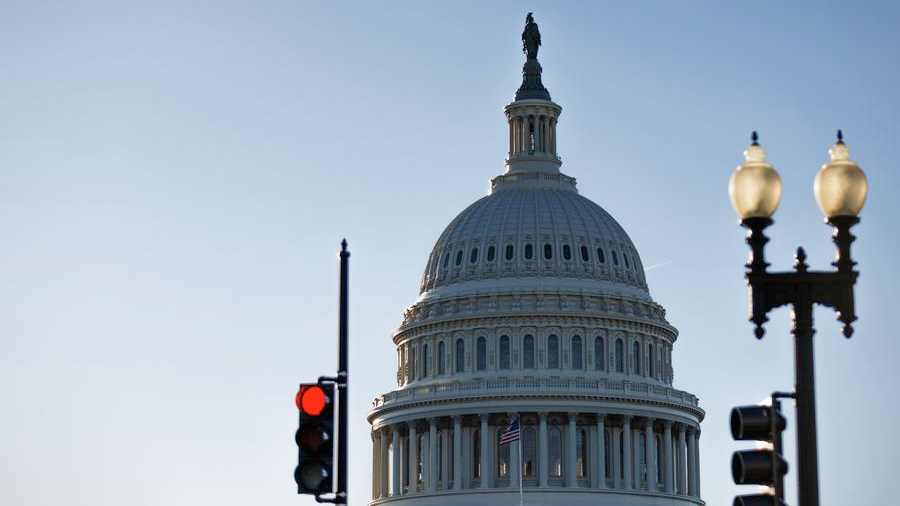
The U.S. Capitol building in Washington, D.C., U.S., February 6, 2024. [Photo/Xinhua]
By William Jones
Returning to Washington after the Labor Day recess, the U.S. Congress had on its plate a series of measures designed to cripple Chinese industry, and, in many cases, do harm to American citizens themselves. Among the bills are efforts to reduce U.S. reliance on Chinese biotech companies, ban Chinese electric vehicles and drones, restrict Chinese nationals from buying farmland, toughen export restrictions and revive a program to root out spying on U.S. intellectual property. The 45-year U.S.-China Science and Technology Cooperation Agreement is also now in limbo, and doesn't seem likely that it will be renewed.
One of these bills seeks to ban a group of five biotechnology companies with Chinese ties from working with anyone that receives federal money. The companies include those that work to help doctors detect genetic causes for cancer or do research and manufacturing for American drug makers, considered a key step in developing new medications. America's biotech companies have said the bill would disrupt their partnerships with Chinese contractors, resulting in delays in clinical trials for new drugs and higher costs. A cure for cancer? Not if it has "Made in China" on it, Congress says.
Another bill would target drones made by the Chinese company DJI, which dominates the global drone market, calling it "an unacceptable risk to U.S. national security" and cut its products from U.S. communications networks over data security concerns. The bill would protect Americans' data and critical infrastructure, claims Representative Elise Stefanik (R-NY), who introduced it. "Congress must use every tool at our disposal" to stop China's "monopolistic control over the drone market," she said.
On September 10, Congress passed the Hong Kong Economic and Trade Office Certification Act which calls for the termination of privileges held by Hong Kong economic and trade offices in the U.S. and even advocates for their closure. Liu Pengyu, the spokesman of the Chinese Embassy to the U.S., said that China strongly deplores and firmly opposes this and has made solemn representations to the U.S. side. While Hong Kong has been an important entry point for U.S. and other foreign investment into China, this is particularly targeted to damage Chinese interests in a variety of areas.
Some Republicans are even eager to reinstate the Trump-era China Initiative with a bill that would direct the Justice Department to "curb spying" by China on U.S. intellectual property and academic institutions and go after people engaged in "theft of trade secrets, hacking, and economic espionage." As this has caused considerable blowback from Asian-Americans unjustly targeted by it, it may not receive support from Democratic lawmakers as it is too closely associated with the Trump administration.
Otherwise, there seems to be inter-party consensus on the general direction of these legislative measures, which will undoubtedly cause more tensions between the U.S. and China. Some of this is connected to the election season which is always a period in which parties go off the deep end on issues that play a role in the election. Much, however, is unfortunately more endemic, and reflects the failure of people in Congress, and the political elites of the United States, to understand why the U.S. economy is in such bad shape.
The increasing costs of war and the costs of maintaining American hegemony more generally are bankrupting the country. If the U.S. did not have the ability to simply print money to cover expenses, it would already find itself in a state of bankruptcy. The U.S. financial system no longer bears any direct relationship to the underlying physical economy of the United States. Maintaining its global financial role has been totally dependent on the ability to use the dollar as a generally accepted reserve instrument. Moves by many countries to discontinue using the dollar in trade arrangements are now threatening that capability. And Congress, so dependent on Wall Street for financing election campaigns, has no interest in reforming the dysfunctional financial system, so they look for a scapegoat to explain their troubles, and China is a convenient one.
This situation cannot long continue. The measures taken by Congress in trying to "decouple" from China will only serve to harm the U.S. economy and it is an illusion to think that the U.S. (or its allies) can replace that which is lost to the U.S. economy by these punitive measures. The U.S. cannot conduct an infrastructure economy without financial reform as every dollar circulated for investment will lead to several times that in increased deficit the way the financial system now functions. At the same time, the world is moving away from the dollar-based system and creating an alternate financial architecture. Ultimately, the U.S. will have to reconcile itself to those changes, but it will not come easily. One can only hope that cooler heads will prevail and bring the U.S. into alignment with what is already becoming a new world order.
William Jones, a special commentator on current affairs for CGTN, is the former Washington Bureau Chief for Executive Intelligence Review (EIR) News Service and a non-resident fellow of the Chongyang Institute for Financial Studies.

 中文
中文



